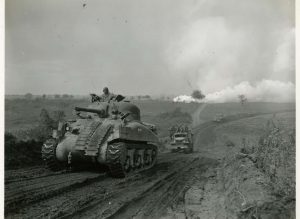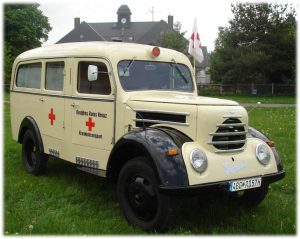We were awakened at dawn by a loud explosion in the yard outside the warehouse. We rushed to the open doors to see, on a rise about half a mile away, a squadron of tanks silhouetted against the early light. They were firing at the warehouse, and two further explosions forced us to dive for whatever cover we could find. The S.S. Officer rushed about issuing stick grenades to his men. He was prepared to die in battle, but his men were not, and suddenly one raised his rifle and shot the officer in the back. As he fell to the ground the others threw down their weapons and raised their hands in the air. We had no time for them as we raced out of the warehouse yard towards the tanks. As they saw us coming they ceased firing.

A Sherman Mk 4 tank probably similar to the one that liberated Dad.
I reached the leading tank and suddenly the turret was opened and I heard the voice and saw the face of the man for whom I had waited so long. He was a black American, and he said, “You coming to Berlin with us boy?” “No thanks”, I replied. “Which is the way back home?” “You got a long way to go, and we can’ t help”, he went on. He threw out a packet of cigarettes, and the Yorkshireman and I resolutely turned our faces towards the west. We were free, and we intended to remain free.
We did not wait to see the results of the action, and half-running and half-walking we came to the village we had passed through as prisoners the previous evening. Now there were white sheets hanging from the windows of houses, but the streets were empty, and doors were locked. We grabbed a bicycle from outside the village post office and I pedalled furiously whilst the Yorkshireman sat on the crossbar. We changed places frequently, and soon were about ten miles from the scene of our escape. We were also alone, so we stopped to consider our next move. Our assets were small. We had no food, weapons or maps – we knew nothing of the state of the war. There seemed to be no sign of troops of either side. In the euphoria of our freedom we had entered as pawns into the deadly “end-game” of the final battle for Germany.
We decided to make our way to the nearest village and hope that it was one which had “surrendered”. After riding our bicycle for about twenty ninutes, we entered the outskirts of a small hamlet and were relieved to see the tell-tale white sheets. We hammered at the door of the first house we came to and demanded food and water from the occupants – an elderly couple. We had lived so long on a knife edge between survival and death that we had no thought for the terror which we would be striking into the hearts of the people of that nation which had so abused us. We were given bread, sausage and wine, and we sat at a table for what was to us a feast beyond belief. We left immediately without even a backward look or word of thanks – we were ‘entitled’ to what we had eaten, and if the Germans starved, so be it.
We rode on for a number of miles and were joined by six othersof our column using the same form of transport, although they were lucky enough to have a bicycle each. Progress was slow until we came to the suburbs of a small town. It had surrendered, and an American tank stood in the main square as an occupying force. We needed a faster means of moving, and we knew where to get it. We sought out the local hospital and found what we wanted – an ambulance. We knew that such vehicles would still be in reasonable condition and would have an allocation of fuel. We asked directions of the tank commander, and set off with the Yorkshireman driving and I sitting by his side whilst the others were in the back. We two in front wore white overalls which we had extracted from a room near the hospital entrance.

A restored Red Cross ambulance that might be similar to the one he stole.
We drove for about sixty miles, passing through several German army units without being stopped, and on one occasion even barricades were lifted to let us through. There was still resistance in the area, and each village was a hazard. Suddenly our engine faltered and then failed. We had no time to waste so we pushed the ambulance off the road, discarded our white overalls, and proceeded on foot. We agreed to split up again, as it was always our belief that one or two might get through, whereas a larger group might not.